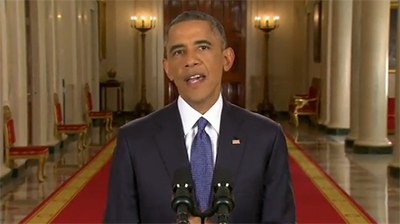If you want to regularize the status of millions of illegal aliens, one obvious way to do it is to encourage some aliens to go home voluntarily.
Once they have left the country, these individuals cease to be a problem to our society — and if they do so of their free will no one can complain that they were treated badly.
Mitt Romney understood that (and was unfairly beaten up for his use of the term "self-deportation".)
Barack Obama apparently does not. I see nothing in his administration's detailed plans that even hints of such a program.
The advantages are obvious. There is no coercion. Every single departure reduces the size of the illegal alien population in the United States. What's not to like?

There is one obvious problem: The prior decision of the aliens involved to come to the United States illegally. This obvious challenge is augmented by the administration's obdurate sense that all aliens are good for the United States, save a few ax-murders, so it has apparently not even thought about the advantages of return migration.
My basic notion is that most illegal migration is motivated by economics. There are easy and relatively inexpensive techniques for using these same economic motivations to encourage return migration, and today I want to explore one small example of such techniques. (Using the tax and Social Security systems to encourage emigration is another, more complex subject.)
My further notion is that the nation as a whole has sound economic reasons for wanting to encourage return migration. Those who can be encouraged to leave are likely to be net users of tax money in the long term, and it is better for us to spend a little thought now to encourage their departure to avoid large expenditures on them in the future.
I was reminded of this by some discussion around the edges of an obscure element of the administration's amnesty plan — something called advance parole. In the typically convoluted language of the immigration system (where "voluntary departure" is a mandated exit, for example) advance parole is a benefit extended to illegal aliens now in the nation who want to leave and return at some time in the future.
One of the ironic byproducts of enhanced — but still incomplete — border security is that illegals who have managed to get over the border once often are leery of leaving the country because they worry, with some justification, about their ability to get over the border again. So they stay here in illegal status, while a generation ago, when the southern border was easier to penetrate, the same people would spend part of the year in Mexico and part in the United States.
So one of the many benefits that the administration is offering illegals currently is the ability to re-enter the country even though these aliens are still in non-lawful status. The document that permits this is the advance parole. The fee is $360 and the process is routinely handled within the United States before the alien departs. In short, currently illegals pay the fee before they leave the United States.
As my colleague Jan Ting has pointed out, the use of advance parole in the administration's amnesty edict is totally contrary to the law, but let's assume for the moment that the White House ignores this good advice and goes ahead with its current plans for advance parole. In that case I have this:
Modest Proposal. The government's current advance parole scheme has it all backwards — we should encourage people to leave our over-populated nation. There should be no financial cost connected to departing.
The fee should be charged upon the alien's re-entry, not before.
My thought, of course, is that when some of them leave the nation they will stay away, whether they plan to or not, and that should be encouraged. If they can leave for free and only have to pay the $360 when they come back, some of them may decide not to return. Some of them will leave thinking they can raise the $360 in another nation, and sometimes that won't happen.
In that event, the aliens involved were illegal when they left and now they are, in all likelihood, legally present in some other nation. That's a good thing.
There are, as always, some details to be considered. One currently needs to complete the USCIS form I-131 in order to obtain advance parole. In it the government collects a certain amount of useful information on the illegal alien involved and the form should continue to be part of the reformed advance parole process.
Further, there is the matter of the payment of the $360 fee at the port of entry. There are three reasons it would be a good idea for the payment not to be in the form of cash. The returning illegal should be forced to secure a bank check in U.S. dollars made out to USCIS for this purpose. Why?
- Making the process a little more clumsy and more expensive may discourage its use;
- Returning illegals would be protected from robbers lurking just on the other side of the border, seeking these funds; and
- Ports of entry wouldn't have to handle cash.
A small matter to be sure, but we should begin to think through how we handle a variety of immigration matters to make sure that emigration to the home country is always available and is, preferably, made attractive to the illegals involved.
